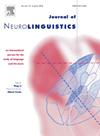领域通用基因和语言特定基因会影响双语语言控制吗?来自振荡的证据
IF 1.2
3区 心理学
Q2 LINGUISTICS
引用次数: 0
摘要
语言控制是一个复杂的认知过程,关于其决定因素及其与领域控制的关系一直存在争议。最近,研究人员开始研究基因在语言控制中的作用,但我们对这种影响的理解,无论是特定语言还是一般领域,仍然有限。在本研究中,双语者在完成提示语言转换任务的同时,用脑电图记录他们的大脑活动。行为表现和δ振荡分析表明,FOXP2-GA双语者和BDNF-CC双语者在语言模式选择阶段会产生由语言(L1 vs L2)调节的转换成本或反向转换成本。同样,BDNF-TT和KIBRA-CC + CT显示相同的模式,但在词汇选择反应阶段。这些结果表明,基因对语言控制的影响因语言而异。这些发现表明,语言控制是一个复杂的系统,可能反映特定语言的过程,而领域一般控制起补充作用。本文章由计算机程序翻译,如有差异,请以英文原文为准。
Do domain-general and language-specific genes affect bilingual language control? Evidence from delta oscillations
Language control is a complex cognitive process that is subject to ongoing debate regarding its determining factors and relationship to domain-general control. Recently, researchers have begun examining the role of genetics in language control, yet our understanding of such influences, both language-specific and domain-general, remains limited. In the present study, bilinguals completed a cued language switching task while their brain activity was recorded by EEG. Analyses on behavioral performance and delta oscillations indicated that bilinguals with FOXP2-GA and those with BDNF-CC incurred switch costs or reversed switch costs that were modulated by language (L1 vs. L2) during the language schema selection phase. Similarly, BDNF-TT and KIBRA-CC + CT displayed the same pattern, but during the lexical selection response phase. These results suggest that the influence of genes on language control varies depending on the language. These findings indicate language control is a complex system that may reflect language-specific processes, while domain-general control plays a supplementary role.
求助全文
通过发布文献求助,成功后即可免费获取论文全文。
去求助
来源期刊

Journal of Neurolinguistics
医学-神经科学
CiteScore
3.90
自引率
5.00%
发文量
49
审稿时长
17.2 weeks
期刊介绍:
The Journal of Neurolinguistics is an international forum for the integration of the neurosciences and language sciences. JNL provides for rapid publication of novel, peer-reviewed research into the interaction between language, communication and brain processes. The focus is on rigorous studies of an empirical or theoretical nature and which make an original contribution to our knowledge about the involvement of the nervous system in communication and its breakdowns. Contributions from neurology, communication disorders, linguistics, neuropsychology and cognitive science in general are welcome. Published articles will typically address issues relating some aspect of language or speech function to its neurological substrates with clear theoretical import. Interdisciplinary work on any aspect of the biological foundations of language and its disorders resulting from brain damage is encouraged. Studies of normal subjects, with clear reference to brain functions, are appropriate. Group-studies on well defined samples and case studies with well documented lesion or nervous system dysfunction are acceptable. The journal is open to empirical reports and review articles. Special issues on aspects of the relation between language and the structure and function of the nervous system are also welcome.
 求助内容:
求助内容: 应助结果提醒方式:
应助结果提醒方式:


